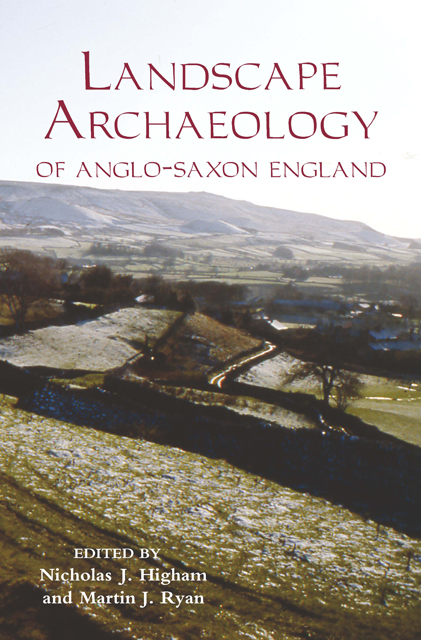Book contents
- Frontmatter
- Contents
- List of Illustrations
- Contributors
- Acknowledgements
- Abbreviations
- 1 The Landscape Archaeology of Anglo-Saxon England: An Introduction
- 2 Barriers to Knowledge: Coppicing and Landscape Usage in the Anglo-Saxon Economy
- 3 Landscape Change during the ‘Long Eighth Century’ in Southern England
- 4 Population Ecology and Multiple Estate Formation: The Evidence from Eastern Kent
- 5 Exploring Black Holes: Recent Investigations in Currently Occupied Rural Settlements in Eastern England
- 6 Medieval Field Systems and Settlement Nucleation: Common or Separate Origins?
- 7 The Environmental Contexts of Anglo-Saxon Settlement
- 8 Calendar Illustration in Anglo-Saxon England: Realities and Fictions of the Anglo-Saxon Landscape
- 9 The Anglo-Saxon Plough: A Detail of the Wheels
- 10 ‘In the Sweat of thy Brow Shalt thou eat Bread’: Cereals and Cereal Production in the Anglo-Saxon Landscape
- 11 The Early Christian Landscape of East Anglia
- 12 The Landscape and Economy of the Anglo-Saxon Coast: New Archaeological Evidence
- Index
10 - ‘In the Sweat of thy Brow Shalt thou eat Bread’: Cereals and Cereal Production in the Anglo-Saxon Landscape
Published online by Cambridge University Press: 16 February 2023
- Frontmatter
- Contents
- List of Illustrations
- Contributors
- Acknowledgements
- Abbreviations
- 1 The Landscape Archaeology of Anglo-Saxon England: An Introduction
- 2 Barriers to Knowledge: Coppicing and Landscape Usage in the Anglo-Saxon Economy
- 3 Landscape Change during the ‘Long Eighth Century’ in Southern England
- 4 Population Ecology and Multiple Estate Formation: The Evidence from Eastern Kent
- 5 Exploring Black Holes: Recent Investigations in Currently Occupied Rural Settlements in Eastern England
- 6 Medieval Field Systems and Settlement Nucleation: Common or Separate Origins?
- 7 The Environmental Contexts of Anglo-Saxon Settlement
- 8 Calendar Illustration in Anglo-Saxon England: Realities and Fictions of the Anglo-Saxon Landscape
- 9 The Anglo-Saxon Plough: A Detail of the Wheels
- 10 ‘In the Sweat of thy Brow Shalt thou eat Bread’: Cereals and Cereal Production in the Anglo-Saxon Landscape
- 11 The Early Christian Landscape of East Anglia
- 12 The Landscape and Economy of the Anglo-Saxon Coast: New Archaeological Evidence
- Index
Summary
Introduction
Three major changes took place in arable farming during the Anglo-Saxon period. One was a change in the landscape, one in technology, and the third in the assemblage of crops that Anglo-Saxon farmers grew. The first, the reorganisation of much of England's arable land into open fields, is already the object of a substantial body of scholarly work, so it might seem redundant to venture yet another account of this transformation. But the intention in this paper is to explore the relationship there might have been between this major landscape change and the two other developments mentioned above, namely the adoption of the ‘heavy’ mould-board plough and the transition from a largely barleygrowing regime to one where wheat, and especially bread wheat, Triticum aestivum L., was the dominant cereal crop. A link between the open fields and the mould-board plough is hardly a novel proposition, but the argument here will be that both of these innovations were made less for the sake of their own virtues than to facilitate the expansion of wheat cultivation. This shift from barley to wheat, although long recognised, has received little scholarly attention, perhaps because Anglo-Saxon historians and landscape scholars have not primarily been concerned with what are sometimes called ‘foodways’. What we are looking at here is essentially a change in diet. But this is a change that could not be made, in an economy in which the population was fed almost exclusively from consumers’ own land, rather than from the market, without concomitant changes in farming practice. These changes, in turn, inevitably produced changes in the landscape. Thus the proposal offered here is that vast tracts of Midland England were transformed into a new kind of landscape primarily because the Anglo-Saxons preferred wheat bread to bread made of other cereals. This will seem eminently plausible to anyone (most anthropologists, for instance) who believes that food is one of the most important elements in human culture, if not the most important. But many historians (at least to judge by the paucity of work on this topic) would feel less comfortable with that idea, and so this paper, by examining each of these major changes in turn, along with some related developments, will attempt to convince a historical readership that the proposal is not in fact outrageous.
- Type
- Chapter
- Information
- The Landscape Archaeology of Anglo-Saxon England , pp. 175 - 192Publisher: Boydell & BrewerPrint publication year: 2010
- 4
- Cited by

